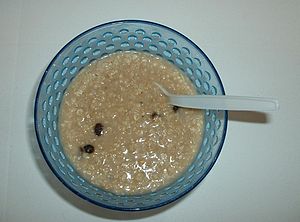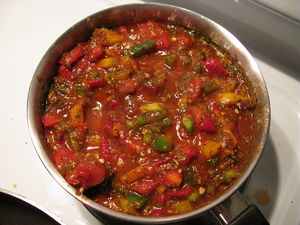This came in Realage.
I do have Almonds, Oranges, Olive Oil, Oatmeal, Blueberries (costly though), Pinto Beans (love the way Neelum cooks them ), Tomoatoes (love them), Avocado (tried Avocado flavoured icecream in Sabah during my recent travel), Dark Chocolate ( Not my favorite)
Happy reading...!!
If you have unhealthy cholesterol levels (or want to prevent them), one of the first things you should examine is your diet. Are you eating foods that help reduce cholesterol? Or avoiding the ones that cause unhealthy cholesterol levels to creep higher? If not, we've got 10 cholesterol-lowering foods you should grab next time you're at the grocery store. Bonus: Lowering your bad (LDL) cholesterol can make your RealAge 3.3 years younger if you're a man, 0.6 years younger if you're a woman!
 |
| Image via Wikipedia |
Almonds
Almonds are pretty hardworking nuts when it comes to lowering your cholesterol. First, they're rich in unsaturated fats that help raise healthy HDL cholesterol while lowering unhealthy LDL. Second, these fats also help make LDL cholesterol less likely to oxidize. Which is a fabulous thing, because when LDL oxidizes, it's more likely to gunk up your arteries and cut blood flow to the heart. Snack away. But do keep an eye on portion size. Almonds are high in calories, and all you need are a couple of ounces a day to reap benefits.
Orange Juice
 |
| Image via Wikipedia |
OJ manufacturers are doing everything they can to make their health food more appealing -- including fortifying their juice with plant-derived cholesterol-busting compounds known as phytosterols. A review of 84 scientific studies revealed that getting 2 grams of phytosterols a day - the amount in a couple 8-ounce glasses of sterol-fortified OJ -- could help lower harmful LDL levels by more than 8 percent. Check with your doctor first regarding whether citrus will interact with any of your medications. If it does, look for sterol-fortified margarine, milk, soymilk, cheese, or breads instead.
Olive Oil
 |
| Image via Wikipedia |
This oil is a nutritional superstar -- rich in antioxidants and heart-healthy monounsaturated fats that help lower "bad" LDL cholesterol and increase "good" HDL. In fact, in a study of people with high cholesterol, blood samples showed less potential for harmful clotting just two hours after the study subjects ate a meal with olive oil. That's because olive oil is rich in phenolics, plant substances that makes blood less likely to clot. All you need is about 2 tablespoons a day for benefit (use it in place of other fats).
Steamed Asparagus
 |
| Image via Wikipedia |
There's nothing wrong with a platter of crudités or a salad if you want to improve your diet, but steaming may help improve the cholesterol-lowering capabilities of some produce, including asparagus. Other veggies that get better after a short bout in the steam: beets, okra, carrots, eggplant, green beans, and cauliflower. Researchers think steaming these veggies may help them do a better job of binding bile acids, which means your liver needs to use up more LDL cholesterol into order to make bile. That translates into less circulating LDL in your bloodstream.
Oatmeal
 |
| Image via Wikipedia |
Your mama was right. Starting the day with a bowl of warm, toasty oatmeal is a smart move. Of all the whole grains, oats are the best source of soluble fiber -- the kind that forms a gel to prevent cholesterol from being absorbed into your bloodstream. Shoot for five to 10 grams of soluble fiber per day. If you have 1¼ cups of cooked oatmeal for breakfast, you'll start your day with 5 grams of the stuff. Top your oatmeal with a chopped-up apple for an extra 3 grams of fiber, and you're set.
Pinto Beans
 |
| Image via Wikipedia |
Next time you make chili, add pinto beans to the pot. They're packed with soluble fiber to help drive down cholesterol. And in a study, people who ate a half-cup of pinto beans a day lowered their total cholesterol by 8 percent in just 12 weeks. Ole! (Tip: If you use canned beans, rinse them to wash away excess sodium.)
Blueberries
 |
| Image via Wikipedia |
You've heard by now that blueberries are a nutritious superfood. One reason why they're so great? They help keep your arteries clear by reducing blood levels of artery-clogging LDL. Researchers suspect it's because the berries support liver function so well. The end result: cholesterol gets swept out of your system much more easily. Enjoy blueberries fresh, frozen, or freeze-dried. They still have the same benefits.
Tomatoes
 |
| Image via Wikipedia |
Include lycopene-rich tomato products in your diet every day for a few weeks, and you may knock your bad LDL cholesterol levels down by as much as 10 percent, according to a recent study. Researchers think the lycopene in tomatoes inhibits LDL production while at the same time helping break down this artery-clogging fat. You'll need to consume at least 25 milligrams of lycopene a day for cholesterol benefits. That's about a half cup of tomato sauce. Bring on the marinara!
Avocado
 |
| Image via Wikipedia |
We always keep ripe avocados in the RealAge kitchen. Why? They're chock-full of heart-healthy monounsaturated fats that help knock down bad LDL cholesterol and triglycerides while boosting healthy HDL cholesterol. Even better, we love the fruit's (yep, it's a fruit) mild flavor and creamy texture. Mash avocado into guacamole, add slices to a sandwich, chop it up in a salad, or -- for a tasty snack -- simply spread a little on whole-grain crackers with a tiny pinch of coarse sea salt.
Dark Chocolate
 |
| Image via Wikipedia |
If you're a chocoholic, here's some good news. Study after study confirms dark chocolate is pretty amazing, healthy stuff. It's full of flavonoids, which are antioxidants that help lower cholesterol. It also has oleic acid, the same type of heart-healthy monounsaturated fat found in olive oil. To improve your cholesterol, just have a little nibble -- up to 1 ounce of dark chocolate a day. And check the label to make sure your chocolate is at least 70 percent cocoa. Cocoa is the stuff with all the heart-healthy ingredients.















